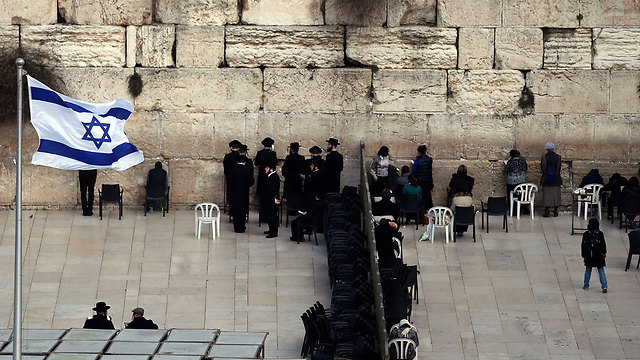Op-ed: A moment before Yom Kippur, it seems we have never been further away from Judaism as a basis of collective identity—a myth, tradition and memory that bring together a group of people for the sake of a better shared future.
A leading radio show with a right-wing, religious affiliation, held a discussion recently on Yesh Atid Leader Yair Lapid’s attraction to Judaism. “There is a feeling that Lapid is eyeing the prime minister’s seat as he poses for photographs at the Western Wall, and as his wife observes the dough offering mitzvah and splits the hoof (a sign of a kosher animal),” the radio host said, dead serious. Her noisy opponent did not even doubt the comment. She may be setting aside dough—but splitting the hoof?
This funny episode is just one in a series of ignorant “Jewish” chatter piling up around us. Somewhere on the folklore spectrum, between the crazy Breslov charlatans and “Kabbalah” institutes with their patron saint, Madonna—can anyone even separate the real from the parody?

All joking aside, these benign offshoots are spreading in the large vacuum created in the Jewish identity of the country’s secular and traditional majority, which is being defeated in battle. This majority has given up on its Judaism—either unwillingly or indifferently—in favor of Orthodox Judaism. And Orthodoxy’s victory is everyone’s defeat—because it is political rather than ethical.
The meaning of this kind of “Judaism” is mainly about prohibitions, constraints and excuses on opening businesses, public transportation and leisure, people marrying whoever they choose, issues of faith or a different sexual inclination and an excuse for being exempt from military service (like I was told in basic training: “If things get difficult, then we say we’re religious”).
The religious community, mainly the Haredi society, is itself undergoing a revolution. And like in any revolution, those who feel that the power is slipping through their fingers react radically. And so the secular-traditional Jew sits and watches in disbelief such disgraces as discrimination between Sephardic and Ashkenazi students in educational institutions, corruption, crushing women’s rights, with ideas like “the voice of a singing woman equals lewdness” and invented “modesty” issues that have no trace in the laws of the Bible. In some sense, this make women’s situation even worse than our grandmothers’ lives in the ghetto, in the shtetl and in the mellah. If these are Judaism’s Lord Keepers of the Privy Seal, he will ask himself, what have I got to do with it?
The second partner in the Orthodox victory, Religious Zionism, has replaced the ancient principles of faith with a single “under no circumstances.” This land is all mine, they say, and the world can explode, or at least the Temple Mount. All the “Jewish” chips are placed on the beginning of the redemption, “self-sacrifice,” are busy preparing us for the religious war that will eventually arrive, Inshallah, against Islam in general and the Palestinians in particular, so that there is no chance to discuss anything else with them. And everyone else basically a traitor who wants to take away their house in their Amona.
The reaction to these “Judaism” shows is sometimes hostile contempt, like the “amulet kissers,” and mostly includes a silent acceptance of exploitation for political gain: this is a “Judaism” that rewrites the Bible to Joshua’s legacy, a “Judaism” that plants a fear of the Holocaust and sends delegations to Poland, all the while having women offer dough and split hoofs.
Secular Israel is missing the point, or the essence. It does not engage in studying our Judaism—or infusing it with its own, original content. For example, what can actually be translated from the Jubilee year mitzvot (in the spirit of Jabotinsky)? How does Maimonides philosophically overcome the problem of the existence of evil? Can we detach the term “gentile” from its ghetto meaning? And what will our children’s holiday and Sabbath look like during the second millennium?
A moment before Yom Kippur, it seems that we have never been further away from the Judaism that acts as a basis of our collective identity —myth, tradition and memory that bring together a group of people for the sake of a better shared future.
As reported by Ynetnews
